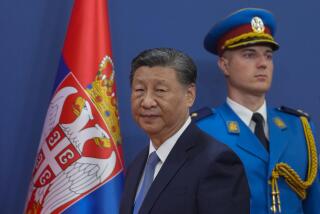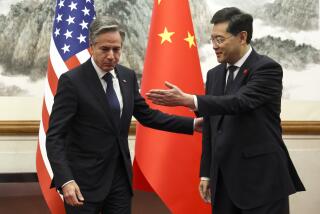NATO Unswayed by Yugoslavia’s Pullout Order
- Share via
BELGRADE, Yugoslavia — The government here announced a partial withdrawal of military and police forces from Kosovo on Monday, but there was no immediate evidence in the Serbian province of any large-scale pullout, and NATO said its bombing campaign will continue until all its conditions for a peace settlement are met.
The pullout order, which the army said it issued Sunday night, was the clearest sign yet that Yugoslav President Slobodan Milosevic is willing to retreat from a conflict that has subjected his country to 48 days of intense bombardment. Over the past week, Yugoslavia’s official media have been preparing public opinion for a compromise with the West.
Bombing continued Monday as warplanes of the North Atlantic Treaty Organization made daylight strikes on several towns in central and western Serbia, killing four civilians and damaging a factory in Cacak, 90 miles south of Belgrade.
U.S. and NATO officials also were trying to mend relations with China after an attack early Saturday in which the alliance mistakenly struck the Chinese Embassy in Belgrade. Angry demonstrations in Beijing appeared to lose some of their passion. China suspended human rights talks and high-level military exchanges, but for the first time Monday held out the possibility of a diplomatic solution to its dispute with the United States if Washington issues an apology for the attack, launches an investigation and punishes those responsible. In Shanghai, local officials also sought to reassure U.S. businesses that they would be safe.
Official Chinese media quoted President Jiang Zemin as saying that continued NATO bombing would make it impossible for the U.N. Security Council to discuss any plan to solve the Kosovo crisis.
Monday’s announcement in Belgrade repeated the Yugoslav army’s assertion that the guerrilla war was over. It did not say how many troops were being pulled out but said forces in Kosovo would be reduced to a “peacetime level” as soon as agreement is reached on a U.N.-led peacekeeping force in Kosovo.
In Washington, Secretary of State Madeleine Albright said Yugoslavia’s announcement of a partial withdrawal from Kosovo was much too little to meet NATO’s conditions for a pause in the bombing.
She said NATO would consider a pause before all Yugoslav troops are out of Kosovo but insisted that there must be a “demonstrable, verifiable [start on] withdrawal of forces.”
But NATO’s tough response pointed to a deadlock, with any withdrawal effort likely to be blocked or delayed by ongoing allied airstrikes on Kosovo’s roads and bridges.
In Russia, which has been attempting to mediate in the conflict, the Foreign Ministry was more positive, terming Yugoslavia’s announcement a “serious step in the right direction.” A Russian envoy pressed a globe-trotting effort to end the conflict, and Milosevic told a visiting former U.N. envoy Monday that he was open to talks on a vague peace proposal outlined Thursday by seven Western powers and Russia--the Group of 8.
The plan might allow some of Milosevic’s troops to remain in the embattled province alongside a U.N.-led peacekeeping force. Milosevic has insisted on keeping 11,000 troops in Kosovo out of the 100,000 he says were deployed there late last month to fight armed ethnic Albanian separatists.
With details of the peace plan still to be worked out, Milosevic continued to face tough, long-standing NATO demands for an end to his violent crackdown on the ethnic Albanian majority in Kosovo--a province of Yugoslavia’s dominant republic, Serbia.
More refugees streamed across the border into Albania on Monday, saying they had been flushed out of hiding in woods and mountains by Serbian forces who threatened to kill them if they didn’t flee.
NATO spokesman Jamie Shea said Monday that the bombing will continue until Milosevic meets all the alliance’s demands in Kosovo, including a total withdrawal of his troops and the return of hundreds of thousands of ethnic Albanian refugees under armed international protection.
Yugoslav officers in Kosovo insisted that they had to move carefully in their withdrawal to cut the risk of being bombed. Destroyed bridges and continued NATO airstrikes were causing their troops “great difficulty” in pulling out, said a military officer in Pristina, the provincial capital, who spoke on condition he not be identified.
Without a pause in the bombing, the army’s troops and heavy vehicles cannot travel in convoys for fear of becoming easy targets for NATO warplanes, the officer said.
The army’s announcement did not say that withdrawal depended on a bombing halt. But Miroslav Lazanski, Belgrade’s leading military correspondent, said the pullout could not proceed without one.
“It all depends on how NATO behaves in the next 24 hours,” said Lazanski, who writes for the newspaper Vecernje Novosti. “Everything will collapse if NATO keeps bombing.”
Russian envoy Viktor S. Chernomyrdin was trying to build momentum into diplomatic efforts to end the conflict.
A day after reporting “very serious new developments” in his mission to reach a peace deal for Kosovo, he took off suddenly for Beijing, where he planned to meet with Jiang.
Chernomyrdin has complained that the bombing of the Chinese Embassy has damaged his efforts to find a solution to the conflict. But after meeting ethnic Albanian leader Ibrahim Rugova on Sunday, he said that there had been important progress and that he had held a long telephone conversation with Milosevic. He declined to give details of the new developments.
Russian officials will try to keep up the diplomatic momentum with a number of high-level meetings this week, including visits from French President Jacques Chirac and U.S. Deputy Secretary of State Strobe Talbott.
In other developments:
* About 100 people, most of them Chinese, gathered in a Belgrade chapel to mourn three Chinese journalists killed in NATO’s attack on China’s embassy. “They are martyrs to our nation and we take them back home as heroes,” Chinese Foreign Ministry spokesman Sun Yuxi told reporters.
Serbian TV quoted Milosevic as telling Chinese special envoy Wang Guozhang that “the bombing of the Chinese Embassy presents another horrific testimony of the NATO aggressor’s insanity.”
* An ethnic Albanian news agency reported heavy fighting between rebels of the Kosovo Liberation Army and Serbian troops near the Albanian border, and claimed that the Serbs lost more than 30 soldiers in the battle.
* NATO officials condemned as “frivolous and cynical” a case brought by Yugoslavia against 10 NATO states at the International Court of Justice in The Hague. Yugoslavia went to the United Nations court Monday to demand an immediate end to NATO’s air attacks on its territory, saying they were tantamount to genocide. Yugoslavia accuses 10 countries, including Britain and the United States, of bombing its territory in breach of their international obligations not to use force against another state.
* The European Union formalized sanctions against Serbia, and for the first time, all 15 member countries agreed to them. Previously, only some members had enacted sanctions. The countries banned Milosevic, his wife, brother, daughter-in-law, and about 300 Yugoslav politicians, military officers and private-sector executives from entering EU countries.
Also banned were all commercial flights between EU and Yugoslav airports. Assets of Yugoslav and Serbian officials close to Milosevic that are held in EU countries will be frozen.
* The State Department issued a 30-page compilation of Serbian atrocities in Kosovo. The report “details what we know from refugee interviews, from overhead imagery and other sources,” Albright said. “And it makes clear beyond any doubt that horrific patterns of war crimes and crimes against humanity are emerging in Kosovo--systematic executions, organized rape, and a well-planned program of terror and expulsion.”
* Assistant Secretary of State Julia Taft, the administration’s chief refugee official, said international relief organizations hope to begin airdrops of food by May 25 to Kosovo Albanians who are trapped in the province. However, she said, the deliveries will not begin until Milosevic gives his approval, something that has not happened.
Having withstood NATO’s airstrikes with his army battered but apparently intact, Milosevic has been searching for a way out of the conflict. Official media have been preparing the public for a possible compromise.
Serbian state television last week showed Milosevic meeting with top military and police commanders in Kosovo who reported the completion of their tasks--defending the country, claiming destruction of the guerrilla KLA and keeping NATO at bay.
In part to get Russia’s agreement, the Group of 8 last week left unclear the composition of a proposed peacekeeping force and the conditions for its deployment. The United States has insisted that the force have a strong NATO component and be well armed, but Russia says NATO troops should not take part without the consent of Belgrade.
After meeting with Milosevic in Belgrade on Monday, Yasushi Akashi, a former U.N. envoy to Bosnia-Herzegovina, said the Yugoslav leader was “quite open to negotiations” on the Group of 8 agreement but “very firm” on wanting a small, lightly armed, U.N.-controlled force in Kosovo.
Boudreaux reported from Belgrade and Kempster from Washington. Times staff writers Paul Watson in Pristina, Alissa J. Rubin in Brussels and Maura Reynolds in Moscow also contributed to this report.
More to Read
Sign up for Essential California
The most important California stories and recommendations in your inbox every morning.
You may occasionally receive promotional content from the Los Angeles Times.













